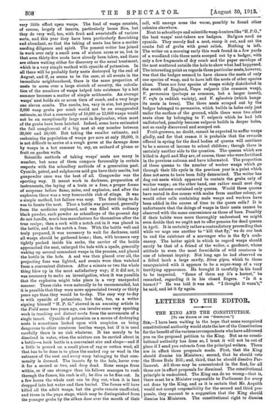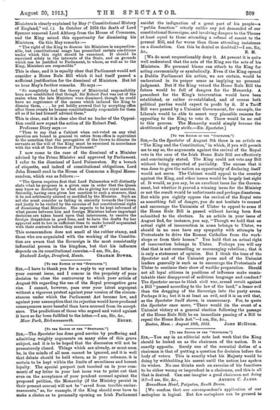LETTERS TO THE EDITOR.
THE KING AND THE CONSTITUTION.
[To IHR EDITOR Or THR "SPECTATOR."] Sin,—I have been waiting in the hope that some recognized constitutional authority would state the law of the Constitution for the benefit of the various correspondents who have addressed you on the proposed petition to the King. But as no consti- tutional authority has done so, I trust it will not be out of place if I send you extracts from the principal writers. There are in effect three proposals made. First, that the King should dismiss his Ministers ; second, that he should veto the Home Rule Bill ; and, third, that he should dissolve Par- liament. All three may be concentrated in the first, for all three are in effect proposals for dismissal. The constitutional principle is undoubted. The King can do no wrong—that is, there must be a Minister responsible to Parliament fey every act done by the King, and as it is certain that Mr. Asquith would not accept responsibility for the second and third pro- posals, they amount to a suggestion that the King should dismiss his Ministers. The constitutional right to dismiss
Ministers is clearly explained by May (" Constitutional History of England," vol. i.). In October of 1S34 the death of Lord Spencer removed Lord Althorp from the House of Commons, and the King seized this opportunity for dismissing his Ministers. On this May remarks :-
" The right of the King to dismiss his Ministers is unquestion- able, but constitutional usage has prescribed certain conditions under which this right should be exercised. It should be exercised solely in the interests of the State, and on grounds which can be justified to Parliament, to whom, as well as to the King, Ministers are responsible."
This is clear, and it is equally clear that Parliament would not consider a Home Rule Bill which it had itself passed a sufficient justification for the dismissal of Ministers. But let us hear May's further remarks. He says :—
" So completely had the theory of Ministerial responsibility been now established that though Sir Robert Peel was out of the realm when the late Ministers were dismissed, though he could have no cognizance of the causes which induced the King to dismiss them, . . . he yet boldly avowed that by accepting office after these events he became constitutionally responsible for them all as if he had himself advised them."
This is clear, and it is clear also that no leader of the Opposi- tion could now repeat the action of Sir Robert Peel.
Professor Dicey says :—
" Thus to say that a Cabinet when out-voted on any vital question are bound in general to retire from office is equivalent to the assertion that the prerogative of the Crown to dismiss its servants at the will of the King must be exercised in accordance with the wish of the Houses of Parliament."
I now come to the case of the dismissal of a Minister advised by the Prime Minister and approved by Parliament. I refer to the dismissal of Lord Palmerston. By a breach of etiquette, and indeed of constitutional obligations, Lord John Russell read in the House of Commons a Royal Memo-
randum, which was as follows :-
" The Queen requires first that Lord Palmerston will distinctly state what he proposes in a given case in order that the Queen may know as distinctly to what she is giving her royal sanction. Secondly, having once given her sanction to such a measure, that it be not arbitrarily altered or modified by the Minister. Such an act she must consider as failing in sincerity towards the Crown and justly to be visited by the exercise of her constitutional right of dismissing that Minister. She expects to be kept informed of what passes between him and foreign Ministers before important decisions are taken based upon that intercourse, to receive the foreign despatches in good time, and to have the drafts for her approval sent to her in sufficient time to make herself acquainted with their contents before they must be sent off."
This memorandum does not smell of the rubber stamp, and those who are acquainted with the working of the Constitu- tion are aware that the Sovereign is the most consistently influential person in the kingdom, but that his influence depends on its constitutional exercise.—I am, Sir, &c., Studtvell Lodge, Droxford, Hants. GRAHAM BOWER.



































 Previous page
Previous page